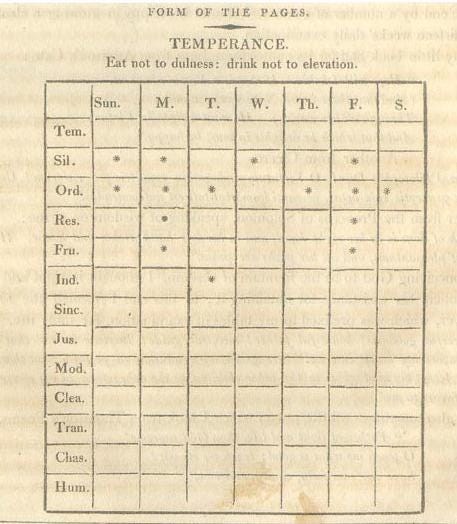Happiness Paved in Virtue
The road to happiness as a balancing act between virtue and vice
Mind Candy is a newsletter on practical philosophy and human flourishment—aka how to live “the good life.” Each month we tackle a new theme.
This month we’re exploring the theme of happiness and flourishment.
For those who desire to be happy, they should first and foremost look to virtue.
While the term has fallen out of favor in the present, the idea of pursuing a life of virtue has been around and is at the root of most of Western philosophy.
To live the good life, one was living a virtuous life. To live a virtuous life meant a life in pursuit of self-flourishment. And self-flourishment (eudaemonia) in Aristotle’s opinion, was happiness.
In the Nicomachean Ethics Aristotle attempts to answer the question of what it means to live a good life. Living a good life meant building good character, and good character was built through the pursuit of virtue, and avoidance of vice.
To Aristotle, when we keep virtue central in our thought process, then each of the actions we take have the aim of good in them.
“Every art and every discipline, and likewise every action and every choice, seems to aim at some good.”
But this is not an easy path. On the contrary, a life in the pursuit of virtue is for the strong-willed, it is for the individuals who truly care about living a virtuous existence.
Benjamin Franklin was a perfect example of this. He would keep track of 13 virtues and each day mark off which ones he was able to practice and incorporate into his life.
This takes continuous dedication. But for those who want to live their best lives, who take human-flourishment seriously as many throughout history have, then one finds joy and happiness in the pursuit of advancing themselves each and every day.
It is through this continuous daily practice that a habit is formed and it is through the habit that virtue becomes second nature to us.
“Men become builders by building houses, and harpists by playing the harp. Similarly, we grow just by the practice of just actions, self-controlled by exercising our self-control, and courageous by performing acts of courage.”
This builds within us an unshakable resolve to appropriate action, regardless of the situations we encounter.
“They must act, first, with knowledge, second, on purpose (choosing the action for its own sake) and, third, they must be firmly disposed to perform the action and unshakeable....”
Eudaemonia is therefore achieved when we flourish in our actions. We become happy through the pursuit of virtue because we ourselves feel we are pursuing a just end and we’re concurrently seeing the impact of such actions day in and day out.
When Aristotle says, “Happiness requires both complete virtue and a complete life,” it is because we must, on a daily basis, put in the work, encounter different situations, and always try and encounter those scenarios with a mindset attuned to virtue and the good.
Again, none of this is easy. Every day we are torn between doing something for ourselves versus for the betterment of others. We’re thrown into situations that have no clear cut answers. We’re influenced by those around us on how to act. We have our emotions attempting to tell us what to judge and how to act.
And so Aristotle knew there was no clear-cut answer to every situation. Aristotle’s virtues are on a sliding scale, constantly trying not to over indulge in a virtue or a vice but rather find balance between them.
Persistence is a great character trait, but what if you sprain your ankle during a run and decide to continue running? You’re likely going to do far greater damage to your ankle than a simple sprain and by doing so are no longer persistent but now injured because of bad judgment.
Or take being courageous. Everyone wants to be brave and it is important to be and to stand up for yourself. But what if someone puts a gun to your head and demands your wallet? If thinking now is the time to be brave and fight off the gunman, you’re off the mark and likely could end up seriously injured or dead.
This is why it is a balancing act across every situation we encounter. The golden mean is why Aristotle advises we want to try and have the right “feelings at the right time, at the right objects and people…” This, he says, is “the mark of virtue.”
And when we can properly do this, when we can find such balance within our lives, we quickly find happiness around every corner. Because we’re not just working towards virtue, we’re making right decisions that lead to the best outcomes in the situations we encounter.
They won’t always be what we want, and they won’t always lead to happiness, but the pursuit of the right decision, at the right time, in the right circumstances helps lead us to a life of flourishment and therefore happiness as a byproduct.
Before you go…
If you enjoyed the above article, you may be interested in this to continue your exploration:
Thank you for reading Mind Candy. If you enjoyed this work, please consider upgrading to a paid subscription. Or if now isn’t the right time, please share to someone who could benefit.
Until next time,
D.A. DiGerolamo
We are a participant in the Amazon Services LLC Associates Program, an affiliate advertising program designed to provide a means for sites to earn advertising fees by advertising and linking to Amazon.com.











I find it deeply reassuring that Ben Franklin failed to be consistently virtuous in any way beyond keeping quiet and orderly in the week given as a sample. In particular, that he failed to maintain chastity, moderation or humility for a single day